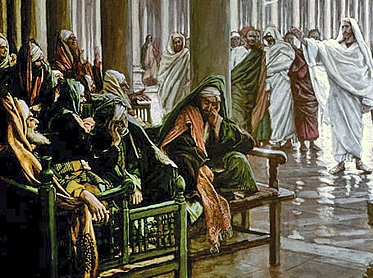Jesus said to the chief priests and elders of the people:
"What is your opinion?
A man had two sons.
He came to the first and said,
'Son, go out and work in the vineyard today.'
He said in reply, 'I will not, '
but afterwards changed his mind and went.
The man came to the other son and gave the same order.
He said in reply, 'Yes, sir, ‘but did not go.
Which of the two did his father's will?"
They answered, "The first."
Jesus said to them, "Amen, I say to you,
tax collectors and prostitutes
are entering the kingdom of God before you.
When John came to you in the way of righteousness,
you did not believe him;
but tax collectors and prostitutes did.
Yet even when you saw that,
you did not later change your minds and believe him."
-Matthew 21:28-32
One of the aspects of the Gospel that I reflected on today is the two ways presented by Jesus: the first that of those who rejected God but repented and the second that of the observers of the Law who thought they had no need of repentance.
One way to engage with this is to explore how in my life that I have lived either of these ways, and I did spend time considering how I have alienated myself from God because of pride or because of shame. But after bringing these areas of my life before Jesus, I also began to reflect on the Third Way, that of both observing the law and repenting. The law of the Church is of course the new commandment, love one another. As I have loved you, so you also should love one another (John 13:34), but the nature of this commandment can also easily be reduced to moralism in practice that excludes the need to repent.
One of the most difficult aspects of the spiritual life in the beginning is accepting who I am right now. I want to be much better than I am, and I do not want to approach God before I have improved myself. It is a difficult truth that I must accept myself in order to accept that God loves me as I am right now. It goes against the implicit human approach to repentance, that I repent because I want God to love me, while in fact it is because God loves me that I repent.
I sincerely repent when I come to know that God loves me and desires repentance for salvation; any other approach to repentance is not life-altering, unless the imperfect contrition of fear leads to the perfect contrition of love. It is the forgiveness of the penitent that opens one to love, for the one to whom little is forgiven, loves little (Luke 7:42) and the one who is forgiven much loves much. Repentance opens the heart to the love of God that is then shared freely in keeping the Lord's command.


No comments:
Post a Comment